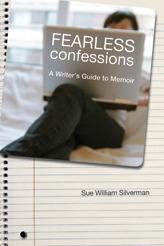Five Reasons Why Your Life Will Improve By Writing Memoir
 Have you ever dreamed of writing your life story? Maybe you have had a difficult experience you long to share with others. Or perhaps, you’ve done something remarkable that could help readers connect with their inner courage. This month, the Write Now! Mastermind class welcomes memoirist Sue William Silverman to talk about, How to Write a Memoir on April 25, 2012 at 12:00 PM CDT (Think Chicago).
Have you ever dreamed of writing your life story? Maybe you have had a difficult experience you long to share with others. Or perhaps, you’ve done something remarkable that could help readers connect with their inner courage. This month, the Write Now! Mastermind class welcomes memoirist Sue William Silverman to talk about, How to Write a Memoir on April 25, 2012 at 12:00 PM CDT (Think Chicago).
Sue William Silverman is an award-winning memoir author, a writing teacher in the MFA Program at Vermont College of Fine Arts, and the author of Fearless Confessions: A Writer’s Guide to Memoir. In today’s post, Silverman presents five reasons why writing a memoir will improve our lives! Enjoy!
Five Reasons Why Your Life Will Improve By Writing Memoir
Growing up, I lived a double life. On the face of it, we seemed like a normal, happy family: My father had an important career. We lived in nice houses and wore pretty clothes. But all this seeming perfection was a veneer, masking the reality that my father sexually molested me, a reality never spoken aloud.
Later, as an adult, I continued to live a double life: this time as a sex addict. Again, in public, I appeared normal, with a seemingly good marriage. No one knew that the shiny façade hid dark secrets: I cheated on my husband.
Before I began to write, I didn’t fully understand the effects of the past on the present. Instead, for years, the past appeared in my mind’s eye like faded black-and-white photographs, in which no one, especially me, seemed to be fully alive.
Then I started putting words on the page. Finally, I chose to examine my past.
I encourage you, and you, and you, to explore, through writing, your life, as well. Whether your childhood was traumatic or not, whether your current life is in disarray, chances are you do have a story to tell. Whether, say, you’re figuring out a divorce, taking notes about a recent illness, exploring the disruption caused by a parent in the military, or worrying about a visit with an estranged mother, we write memoir to better understand ourselves, as well as to bring a reader with us on our journeys.
Here are five reasons why your life will be improved by writing a memoir, by telling your own story.
One: Memoir Helps You Understand the Past. I gain much clearer insights about my past when I write, than if I simply sit around thinking about it, in the abstract. What was the relationship between the sex addiction and being molested by my father? How did the past cause such emotional devastation? I discovered the answers to these important questions through the written word.
Writing is a way to interact with—and interpret—the past. It helps us make sense of events, whether they are traumatic, joyful, or maybe just confusing. Writing sharpens our senses so that images and details from the past emerge in a new context, one that illuminates events for ourselves as well as for our readers.
Two: Memoir Organizes Your Life. Just living my life day by day, I never stop long enough to question events. There’re errands to run, meals to cook—to say nothing of emotional clutter! Who has time to stop and think about events swirling around us?
Only when I put my everyday life on hold, so to speak, sit down at my computer and write, can I even begin to see a pattern to the rush-and-tumble of life.
Memoir writing, gathering words onto pieces of paper or on a computer, helps us shape our lives. By discovering plot, arc, theme, and metaphor, we give our lives an organization, a frame, which they would not otherwise have. Memoir creates a narrative, a life story.
Three: Memoir Helps You Discover Your Life Force. Before I wrote, while I kept secrets, I didn’t feel as if I were really living my life. I didn’t have a clear grasp as to who I was. What, and who, was the essence of “me”? There are thousands of other incest survivors. How was my story different?
When writing, if I forge even one good sentence on any given day, I have discovered a kernel of emotional truth. I feel that life force of “me,” as if it’s my pulse. To write is to give birth to a more complete self.
There is only one of you. Your voice is unique. If you don’t express yourself, if you don’t fully explore who you are, that essence of you will be lost.
Four: Memoir Helps Others to Heal. One thing I most love about writing memoir, is that it affords me the opportunity to meet many courageous people, still struggling.
For example, after I completed a reading at a library in Athens, Georgia, one woman waited until everyone else had departed. Approaching me, she was so scared she began to cry. She confided that I was the first person she’d told that her father had molested her. She was too traumatized even to tell a therapist. Why did she confide in me, trust me? Simply because I had written my story. Through this meeting, both of us were empowered.
Five: Confessing, through Memoir, is Good for the Soul. Telling family secrets—any intimate secret—can be scary. Finally, however, I reached a place where not telling the secrets was worse. I felt heavy, weighted down. Finally, then, it was more a relief to write my life, then ignore it. So even though at times I felt scared or uncomfortable, I ultimately felt a sense of release and power.
In short, with every word the pain lessened. It was as if I extracted it, one word at a time.
As you challenge yourself, you’ll feel more courageous every day. Writing memoir energizes your psyche, nourishes your soul.
About the author: Sue William Silverman’s memoir Love Sick: One Woman’s Journey through Sexual Addiction is also a Lifetime TV movie. Her memoir Because I Remember Terror, Father, I Remember You won the AWP Award. Fearless Confessions: A Writer’s Guide to Memoir won honorable mention from ForeWord Review. Her poetry collection is Hieroglyphics in Neon. She teaches in the MFA Program at Vermont College of Fine Arts. Please visit www.SueWilliamSilverman.com










Pingback : A.Lynne's Themes of Life
Pingback : Five Reasons Why Your Life Will Improve By Writing Memoir | Write Now Coach! Blog | personal storytelling | Scoop.it
Thanks for the wisdom! This is a good reminder. Writing memoir is hard but helpful!
Thanks for your comment, Sarah. Yes, it’s true, writing memoir (writing anything!) is difficult. But we still have to do it, right?! I wish you all the best with your own writing!
Great essay, and all of it is true! I struggle with the sharing of my past with the page because it seems so self-indulgent. But, Sue tells the truth more than she knows when she writes about the woman who came to her to confide. Sue’s memoir LOVE SICK was extremely eye-opening for me when I couldn’t understand why the Other Women who my husband had cheated on me would do that to another woman. Sue made that part of my anger about the whole 10 years of infidelity find a way to heal, to forgive, to move on and find out more about myself instead of obsessing about others. I kinda am in love with her for that gift.
HI, Amy — I’m so pleased to know you’re finding that writing about your self is not self-indulgent. As we write memoir, we’re telling universal stories about the human condition. And, as writers, we’re lucky to have this gift, a gift to reach others…to tell stories to which others can relate. I absolutely believe that the memoir you are working on is very important. It will be a gift to many readers. And, personally, thank you so very much, Amy; I’m truly touched by your comments. I’m just incredibly pleased that we met. You are a dear friend!
I want to forward this on to every writing student I’ve ever had. And then I want to paste it onto my computer screen so I’ll see it each morning before I begin working. Thank you!
Judy — how lovely! Thank you. It means so much to me that my article resonated with you. I’ll be thinking of you as you write!!
Thank you, Sue, for sharing these tips, and your story along with them. As someone new to writing memoir, and seeking to stretch those particular writing muscles, I find myself focused on your fifth point, how confessing through memoir is good for the soul. I’ve been a bit startled at what is surfacing in my writing (your point number one) but it’s hard for me to imagine how those who are still alive in this book might feel were it to be published. I guess that’s why it’s called “fearless” confessions.
Patrick, well, yes, I DO think one needs to write fearlessly! And I know — I know — it IS difficult to write our stories, tell our secrets, when people, who might be affected, are still alive. What you say is so true. At the same time, I think of it as honoring the relationship(s) because, finally, the relationships are honest and truthful. In other words, for me, I question how “real” a relationship can be when it is shadowed by silence. Does this make sense? Not that any of this is easy. But these *are* your truths, and if you don’t write them no one else will. They will be lost forever. Thank you so much for posting this. You address very real fears that we all share. But at least we memoir writers have each other!
Thank you, Sue, for the thoughtful response. This is very helpful: “I question how “real” a relationship can be when it is shadowed by silence.”
Here’s a good quote for you: “Books and All Forms of Writing Are Terror to Those Who Wish to Suppress the Truth.” Wole Soyinka
I love this! Thank you.
Pingback : Creativity Tweets of the Week – 4/20/12 « The Artist's Road
Pingback : Monday’s Link Roundup. | Dan Curtis ~ Professional Personal Historian
Sue, thanks for sharing this article. I’m finishing up my memoir. Researching and writing my memoir helped me understand my past and heal from the emotional pain that I carried subconsciously. I grieved the loss of my first love for nearly forty years before I set out to find out what happened to him.
Heddy, that sounds like an amazing story. Thanks for stopping by.
I agree. I have read one or two memoirs of people that are not famous, and I find them very interesting. Each person has his or her tale to tell and that is what I love about it. One delved about twice getting divorce and growing old alone. It is bittersweet.
Pingback : Five Reasons Why Your Life Will Improve By Writing Memoir | Mountain Top Journals